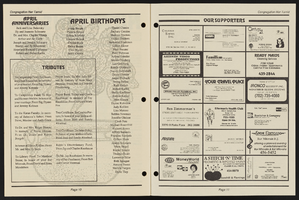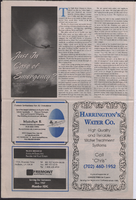Search the Special Collections and Archives Portal
Search Results

Erica Mosca oral history interview: transcript
Date
Archival Collection
Description
Oral history interview with Erica Mosca conducted by Cecilia Winchell, Stefani Evans, and Jerwin Tiu on February 3, 2023 for the Reflections: the Las Vegas Asian American and Pacific Islander Oral History Project. In this interview, Mosca reflects on her life journey from a low-income Asian American to a current serving Nevada State Assemblywoman. She recalls that most of her childhood was in Palm Springs, California where she enjoyed a diverse community of students within her education system. It was not until she moved to Navato, California where she first experienced the economic and resource gap between economically diverse areas. Mosca went on to be involved in a college readiness program and received a scholarship to Boston University. After college, Mosca went on to work for Teach for America where she was stationed on the east side of Las Vegas at Goldfarb Elementary School where she grew a passion for leadership. She eventually returned to school and graduated from Harvard University, returning to Las Vegas to start her nonprofit "Leaders in Training." Mosca hopes to inspire change in her communities by enacting legislation and initiatives targeted towards the communities she was and continutes to be a part of.
Text

Transcript of interview with Ernest Jackson Jr. by Larry E. Cooper, March 1, 1980
Date
Archival Collection
Description
On March 1, 1980, Larry E. Cooper interviewed general contractor Ernest (Ernie) Jackson Junior (born December 6th, 1932 in Bruce, Mississippi) in Cooper’s home about his experiences in the Westside as a Black Las Vegas resident. Jackson Jr. discusses the lack of property buyers on the Westside and his goals of improving the Westside by building on the land. Jackson Jr. also discusses his youth as a baseball star for Las Vegas High School in the fifties.
Text

Christine Szukala oral history interview: transcript
Date
Archival Collection
Description
Oral history interview with Christine Szukala conducted by Bridgette Foote on November 12, 2021 for Reflections: The Las Vegas Asian American and Pacific Islander Oral History Project. Christine shares her family history and the story of her Thai mother and American Air Force father who met in Thailand and married before moving to the United States in 1970. She talks about her upbringing in Las Vegas, Nevada near Nellis Air Force base with her six siblings. Christine discusses her beliefs of how her newly immigrated mother adapted to American life, including altering her recipes to fit her husband's taste and reducing her visits to nearby Buddhist temples.
Text
Southern Nevada Jewish Heritage Project
"The goal of this 2014-2015 project is to build a web and mobile resource that will connect researchers from around the world to thousands of historical items—photographs, brochures, scrapbooks, letters, drawings, videos, and more—detailing the lives and contributions of Jews in Southern Nevada. It will include carefully researched biographies, timelines, and histories of institutions, events, and prominent themes showing the integral roles Jews have played in the history of Southern Nevada.
Corporate Body

Maria Benítez oral history interview: transcript
Date
Archival Collection
Description
Oral history interview with Maria Benítez conducted by Monserrath Hernández and Maribel Estrada Calderón on June 21, 2019 for the Latinx Voices of Southern Nevada Oral History Project. Maria Benítez is the image of a hardworking and determined Salvadoran woman. After facing adversity amidst the Salvadorian Civil War she talks about her journey as a nurse in El Salvador and migrating to the United States. Here in Las Vegas, she has worked as a cook on the Strip, been an active member of her church, and supported the education of her children selling pupusas. Subjects discussed include: El Salvador, Salvadorian Civil War, Migration, US Citizenship Documentation, and Judaism.
Text
Katherine A. Spilde Papers on Native American Gaming
Identifier
Abstract
The Katherine A. Spilde Papers on Native American Gaming include materials collected by anthropologist Katherine Spilde about Native American gaming and the greater gaming industry. The materials date from 1789 to 2015, with the bulk of materials dating from 1995 to 2010. Materials dating from the eighteenth and nineteenth centuries are reproductions of key court opinions and treaties concerning Native American rights and sovereignty. The majority of the materials document Native American gaming following the passage of the 1988 Indian Gaming Regulatory Act (IGRA). The papers detail Native American gaming enterprises both on and off reservations, the socioeconomic impact of gaming, and the legislative history of Native American gaming in the United States. The papers include research and subject files created by Dr. Spilde during her employment with the National Gambling Impact Study Commission (NGISC), the National Indian Gaming Association (NIGA), and the Harvard Project on American Indian Economic Development (HPAIED). The collection includes socioeconomic reports; testimonies; correspondence; memos; press releases; photographs; audiovisual materials; promotional materials from casinos and tourist attractions; brochures; fact sheets; summaries; booklets; pamphlets; advertisements; tourism materials; journal articles; legal briefs; legislative documents; court opinions; Dr. Spilde’s notes; presentations; packets, agenda, schedules, and itineraries from conferences; periodicals; Native American and community newspapers; and newspaper articles. The collection includes materials about over one hundred federally recognized Native American nations. Also included are materials that document the socioeconomic impact of gaming, the international gaming industry, criminal activities related to gaming, advertising about gaming and casinos, lotteries, internet gaming, compulsive gambling, and bankruptcy as a result of gambling.
Archival Collection
Kirsten Searer (Nevada Public Education Foundation) oral history interview conducted by Magdalena Martinez and Taylor Cummings: transcript
Date
Archival Collection
Description
From the Lincy Institute "Perspectives from the COVID-19 Pandemic" Oral History Project (MS-01178) -- Education sector interviews file.
Text

Abraham Gomez interview, December 6, 2019: transcript
Date
Archival Collection
Description
Interviewed by Elsa Lopez. Abraham Gomez is a College Navigator for the Nevada Treasurer's Office where he is responsible for providing and distributing information on post-secondary resources that may enable Nevadans to go to college. Gomez was born and raised in Las Vegas, Nevada and grew up on the East Side near Desert Pines High School. He received an Associate of Arts from the College of Southern Nevada before obtaining a bachelor's degree in Communication Studies from the University of Nevada, Reno. After graduating he worked as a GEAR UP Ambassador for Nevada State College where he advised a cohort of 46 low-income students on the importance of continuing their education. He has volunteered with various organizations throughout Southern Nevada and continues to work to better his community and make education accessible to students everywhere.
Text


